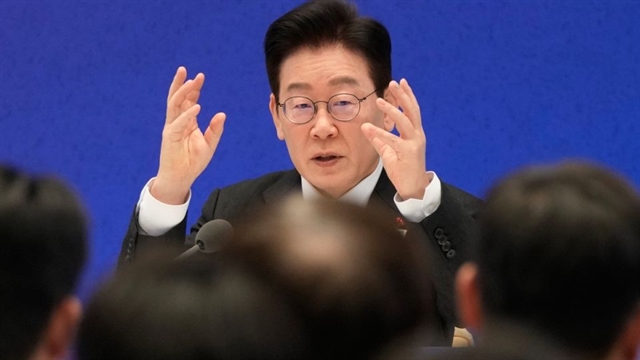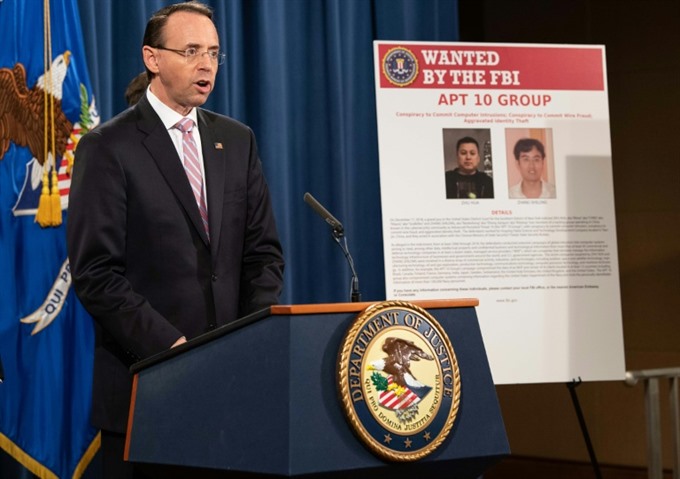 World
World

The US Justice Department on Thursday indicted two Chinese hackers tied to Beijing's security services who allegedly targeted companies and agencies in a dozen countries, which US officials said showed President Xi Jinping had not fulfilled his pledge to stop cybercrime.
 |
| US Deputy Attorney General Rod Rosenstein said the indictment of the two Chinese hackers was meant to rebuff "China’s economic aggression". —AFP |
WASHINGTON — The US Justice Department on Thursday indicted two Chinese hackers tied to Beijing’s security services who allegedly targeted companies and agencies in a dozen countries, which US officials said showed President Xi Jinping had not fulfilled his pledge to stop cybercrime.
Deputy Attorney General Rod Rosenstein said the move was being made to rebuff "China’s economic aggression."
The Justice Department said the hackers had targeted numerous managed service providers (MSPs), specialist firms which help other companies manage their information technology systems -- potentially giving hackers an entry into the computer networks of dozens of companies.
Companies who were hacked were not named, but 45 victims in the United States included key government agencies -- the NASA Goddard Space Center and Jet Propulsion Laboratory, the Department of Energy’s Lawrence Berkeley National Laboratory, and the US Navy, where the personal information of more than 100,000 personnel was stolen.
Internationally, the hackers accessed the computers of a major bank, three telecommunications or consumer electronics companies, mining and health care companies, and business consultancies.
’Unacceptable’
Rosenstein slammed Beijing for repeatedly violating a pledge made by Xi to then-president Barack Obama in 2015 to halt cyber-attacks on US companies and commercial infrastructure.
"These defendants allegedly compromised MSP clients in at least a dozen countries," Rosenstein said. "It is unacceptable that we continue to uncover cybercrime committed by China against other nations."
"We want China to cease its illegal cyber activities and honor its commitment to the international community," he said. "But the evidence suggests that China may not intend to live up to its promises."
In London, the Foreign Office likewise accused China of not living up to their bilateral agreement against hacking driven by commercial and economic motives.
"These activities must stop. They go against the commitments made to the UK in 2015, and, as part of the G20, not to conduct or support cyber-enabled theft of intellectual property or trade secrets," Foreign Secretary Jeremy Hunt said in a statement.
APT10 hacking group
The Justice Department said the two hackers, Zhu Hua and Zhang Shilong, worked for the so-called APT10 group which Washington, London and other allies say is backed by China’s Ministry of State Security.
From at least 2006 to 2018, the APT10 Group "conducted extensive campaigns of intrusions into computer systems around the world," the US Justice Department said.
APT10 stole "hundreds of gigabytes" of sensitive data and information from its targets, invading their systems through the hacked MSPs.
The indictments of the two hackers came less than two months after US indicted 10 Chinese also linked to APT10, including two intelligence officers, over a five-year scheme to steal aircraft engine technology from US and French aerospace firms.
Those cases involved both hacking and recruiting insiders to steal data and IT system passwords.
Beijing on Friday accused Washington of "fabricating facts". We urge the US to "stop smearing the Chinese side on cyber security issues," China’s foreign ministry said in statement, adding that it had lodged an official protest.
China said the US should drop the prosecution "to avoid serious damage to the relations between the two countries".
Beijing accused Washington of "blame-shifting" and of carrying out hacking attacks against other countries.
"It has long been an open secret for the relevant departments of the United States to conduct large-scale and organised network theft and monitoring and monitoring activities against foreign governments, enterprises and individuals," said the statement, attributed to foreign ministry spokeswoman Hua Chunying.
In charging the two alleged Chinese hackers, the Justice Department said the group they work for targeted firms which help other companies manage their information technology systems -- potentially giving attackers an entry into the computer networks of dozens of companies.
Western governments, including US allies Britain and Australia, have accused Beijing of cyber-attacks.
China described those claims as "purely made out of thin air", warning other countries to "stop deliberate defamation of China, so as not to damage... bilateral relations".
Heightened tensions
Relations between Washington and Beijing are already frayed over trade, hacking and geopolitical issues.
In October, the Department of Justice obtained the unprecedented extradition of a senior Chinese intelligence official from Belgium to stand trial in the United States for running the effort to steal US aviation industry secrets.
In early December, Canada arrested an executive of China’s leading Huawei telecommunications company at Washington’s request.
The US plans to charge her with fraud charges related to sanctions-breaking business dealings with Iran.
Since then, China has detained three Canadians, in an apparent bid to pressure Ottawa into fully releasing the Huawei executive, who is now out on bail.
And, according to reports, US officials believe Chinese government-linked hackers were behind the theft of data on some 500 million guests of hotel giant Marriott, first reported on November 30.
Last week, Bill Priestap, head of the FBI’s counterintelligence division, told Congress that China’s cyber-attacks are part of a broad campaign to demote the United States from its leadership position in the world.
"The Chinese government is attempting to acquire or steal not only the plans and intentions of the United States government, but also the ideas and innovations of the very people that make our economy so incredibly successful," he said.
The indictment drew strong support in Congress where Beijing has less and less support.
"For years, China has stomped on international law and has used its cyber capabilities to steal American technology, intellectual property, and private information," said senior Republican Representative Michael McCaul, chairman of the House Homeland Security Committee.
"It sends a clear and direct message that we will punch back when attacked." — AFP




